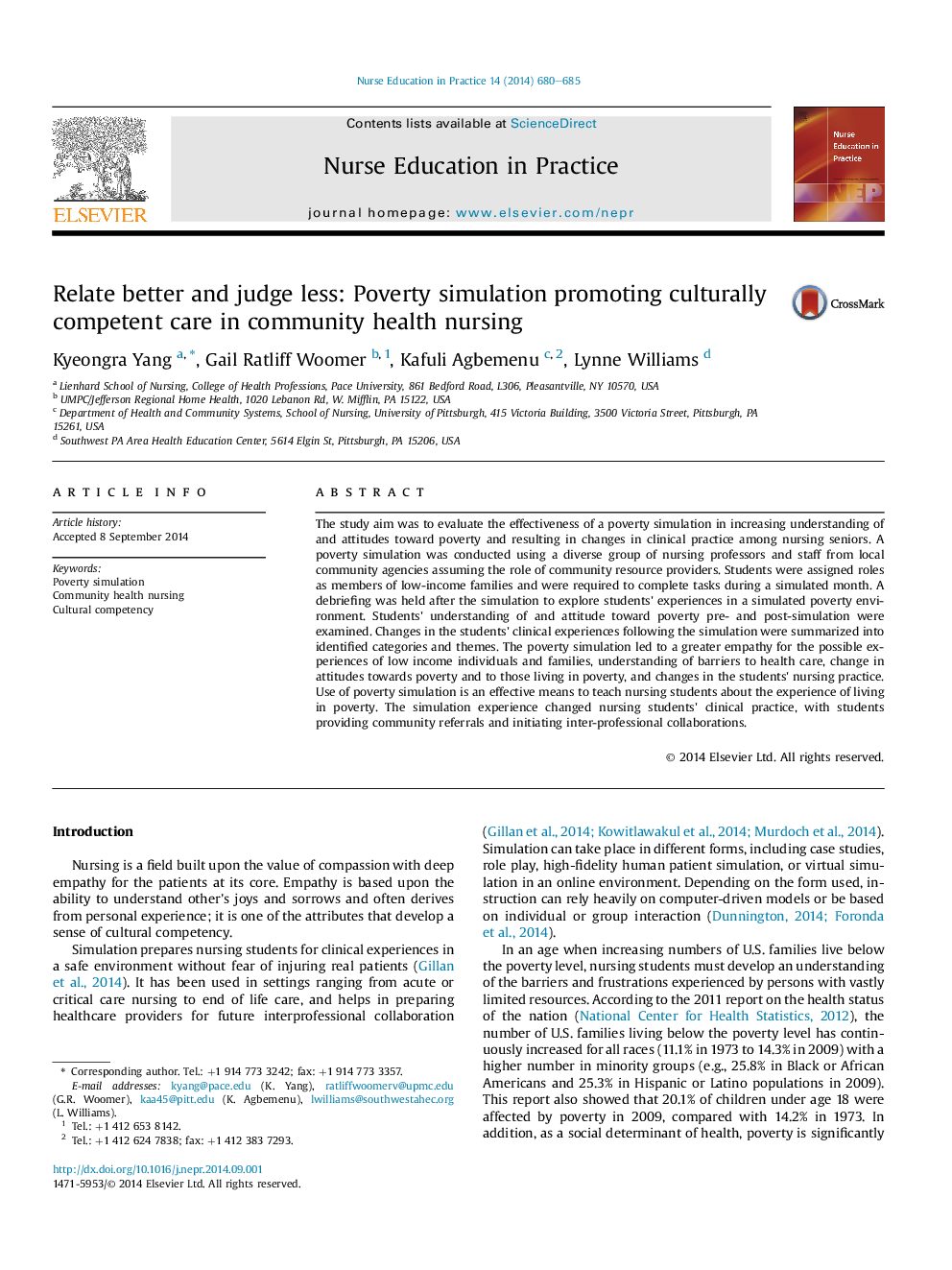| کد مقاله | کد نشریه | سال انتشار | مقاله انگلیسی | نسخه تمام متن |
|---|---|---|---|---|
| 10316031 | 621472 | 2014 | 6 صفحه PDF | دانلود رایگان |
عنوان انگلیسی مقاله ISI
Relate better and judge less: Poverty simulation promoting culturally competent care in community health nursing
ترجمه فارسی عنوان
بهتر است که نسبت به دیگران قضاوت کنید: شبیه سازی فقر، مراقبت های شایسته فرهنگی را در پرستاری بهداشت جامعه ای ترویج می دهد
دانلود مقاله + سفارش ترجمه
دانلود مقاله ISI انگلیسی
رایگان برای ایرانیان
کلمات کلیدی
شبیه سازی فقر، پرستاری سلامت جامعه، شایستگی فرهنگی،
ترجمه چکیده
هدف این مطالعه بررسی اثربخشی شبیه سازی فقر در افزایش درک و نگرش نسبت به فقر و در نتیجه تغییر در عملکرد بالینی در سالمندان پرستاری بود. شبیه سازی فقر با استفاده از یک گروه گوناگون از استادان پرستاری و کارکنان سازمان های محلی محلی که نقش تأمین کنندگان منابع اجتماعی را در بر می گیرند، انجام شد. دانش آموزان به عنوان اعضای خانواده های کم درآمد نقش داشتند و برای انجام وظایف در یک ماه شبیه سازی مورد نیاز بودند. بعد از شبیه سازی، یک دیدار برگزار شد تا تجربیات دانش آموزان در یک محیط فقر شبیه سازی را بررسی کند. درک و نگرش دانشجویان نسبت به پیش از و پس از شبیه سازی به فقر مورد بررسی قرار گرفت. تغییرات در تجربیات بالینی دانشجویان پس از شبیه سازی، به دسته ها و تم های مشخص شده خلاصه شده است. شبیه سازی فقر منجر به همدلی بیشتر برای تجربیات احتمالی افراد و خانواده های کم درآمد، درک موانع در زمینه مراقبت های بهداشتی، تغییر در نگرش نسبت به فقر و کسانی که در فقر زندگی می کنند، و تغییرات در شیوه پرستاری دانشجویان. استفاده از شبیه سازی فقر یک ابزار موثر برای آموزش دانشجویان پرستاری در مورد تجربه زندگی در فقر است. تجربه شبیه سازی باعث تغییر شیوه های بالینی دانشجویان پرستاری شد و دانشجویان ارجاع های اجتماعی و همکاری های بین حرفه ای را آغاز نمودند.
موضوعات مرتبط
علوم پزشکی و سلامت
پرستاری و مشاغل بهداشتی
پرستاری
چکیده انگلیسی
The study aim was to evaluate the effectiveness of a poverty simulation in increasing understanding of and attitudes toward poverty and resulting in changes in clinical practice among nursing seniors. A poverty simulation was conducted using a diverse group of nursing professors and staff from local community agencies assuming the role of community resource providers. Students were assigned roles as members of low-income families and were required to complete tasks during a simulated month. A debriefing was held after the simulation to explore students' experiences in a simulated poverty environment. Students' understanding of and attitude toward poverty pre- and post-simulation were examined. Changes in the students' clinical experiences following the simulation were summarized into identified categories and themes. The poverty simulation led to a greater empathy for the possible experiences of low income individuals and families, understanding of barriers to health care, change in attitudes towards poverty and to those living in poverty, and changes in the students' nursing practice. Use of poverty simulation is an effective means to teach nursing students about the experience of living in poverty. The simulation experience changed nursing students' clinical practice, with students providing community referrals and initiating inter-professional collaborations.
ناشر
Database: Elsevier - ScienceDirect (ساینس دایرکت)
Journal: Nurse Education in Practice - Volume 14, Issue 6, November 2014, Pages 680-685
Journal: Nurse Education in Practice - Volume 14, Issue 6, November 2014, Pages 680-685
نویسندگان
Kyeongra Yang, Gail Ratliff Woomer, Kafuli Agbemenu, Lynne Williams,
